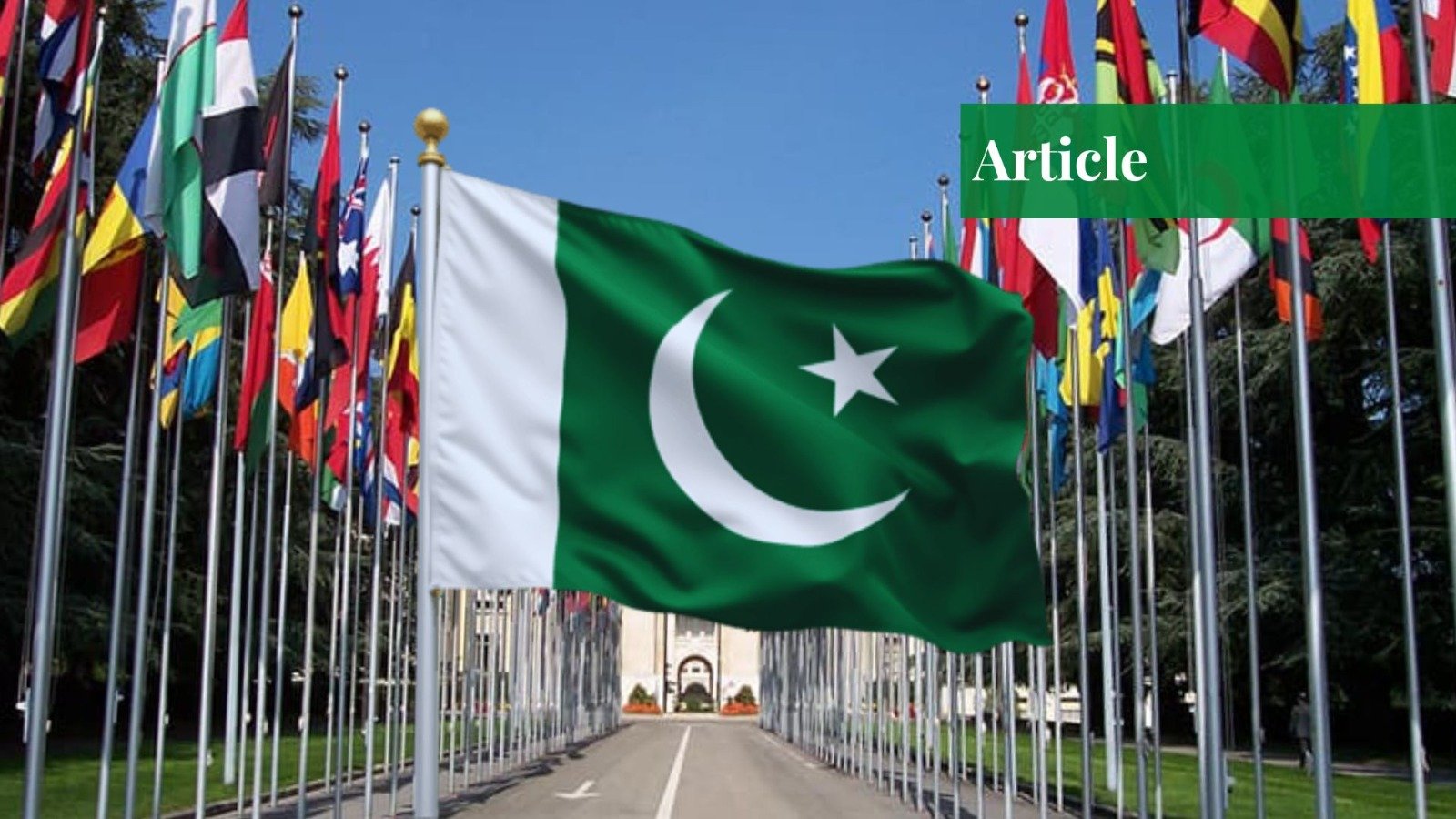Historical Roots of Pakistan’s Dependent Foreign Policy
Currently, the national media is projecting that Pakistan’s foreign policy is at an all-time high. Since its inception, Pakistan has been struggling to pursue an independent foreign policy. Indeed, in international relations, there are no permanent friends or foes, only permanent interests. However, historically, Pakistan’s foreign policy has largely been shaped by the US policies and decisions. Islamabad showed unwavering support for the United States during the Cold War. From training the Taliban to providing intelligence, Pakistan supported the US bloc against the Soviet Union in the Cold War. However, after the US victory in the Cold War, Washington imposed sanctions on Islamabad and showed a diplomatic tilt towards India.
Former Ambassador Abdul Sattar Khan writes in his book, Pakistan’s Foreign Policy 1947-2019, that the United States and other Western nations show no concern over India’s nuclear test. However, the Western world, including the United States, penalized Pakistan for conducting a nuclear test in 1998. This was a sheer display of Washington’s paradoxical role in South Asia. Historical events demonstrate that US-Pakistan relations have always been transactional. The United States established cordial relations with Pakistan whenever it needed a strong regional partner to pursue its regional ambitions. In the early 2000s, Pakistan was coerced by the United States to join its side against the Afghan Taliban in its so-called War on Terror.
The Shift from Geopolitics to Geo-economics
However, after its shameful withdrawal from Afghanistan, the United States used Pakistan as a scapegoat. Many US leaders, especially President Trump, blamed Pakistan for the US failure in Afghanistan. In return, the then political government of Pakistan refuted the US accusation. Pakistan also decided to shift its foreign policy orientation from geopolitical to geo-economic. Pakistan sought to establish its foreign relations on the basis of economic entanglement. The then-Pakistani government also urged the United States to establish long-term economic relations with Islamabad. Pakistan also reviewed its relations with Russia under the new foreign policy orientation. Pakistan also engaged with Bangladesh to establish cordial bilateral ties.
Pakistan also demonstrated its interest in BRICS membership, a move that made it closer to the rising Eastern bloc. Russia and China also pledged to support Pakistan’s BRICS membership bid. However, India’s influence over BRICS is impeding Pakistan from joining the organization. Pakistan-China relations have been further enhanced over the past few years. The fall of the Hasina Wajid government also paved the way for the enhancement of Pakistan-Bangladesh relations. The two countries strengthened their bilateral engagement under the interim government in Bangladesh. Both countries also agreed to strengthen bilateral cooperation in the economic, trade, and investment sectors, a significant milestone in the bilateral relations between the two countries.
Diplomatic Triumphs and Regional Realignments
Pakistan’s victory in the recent Pak-India war increased the diplomatic and strategic significance of the country. During this war, India emerged as a diplomatically isolated country. On the other hand, many regional and international powers showed unwavering support to Pakistan, illustrating the diplomatic success of the country due to its strong foreign policy decisions. Since Pakistan’s victory in this war, Islamabad is now viewed as an established military power on the international stage. US President Donald Trump also invited Pakistan’s Chief of Army Staff (COAS), Field Marshal Asim Munir, to an official dinner at the White House.
This summit had great diplomatic and strategic significance. Soon after the summit, COAS Asim Munir visited Turkey and other regional countries. Allegedly, the COAS played a significant role in establishing a ceasefire between Iran and Israel during this visit. The Kingdom of Saudi Arabia (KSA) also signed a historic defense pact with Pakistan, following the Israeli strikes on Doha, Qatar.
This move is seen widely as the new apex in Pakistan’s foreign policy history. The Pak-Saudi defense pact increased Pakistan’s military and strategic significance globally. After this pact, Pakistan’s relations with the Gulf States have also improved. Azerbaijan also signed a deal with Pakistan to buy 40 JF-17 Thunder fighter jets. Pakistan is rapidly increasing its cooperation with many Central Asian states, a remarkable foreign policy decision.
The US President Donald Trump has also acknowledged Pakistan’s strategic significance on the international stage several times. He also criticized the Modi government and mocked it for losing 7 jets in his press conferences. The US president imposed high tariffs on India while providing significant concessions to Pakistan. However, Washington’s increasing alliance with Islamabad is largely due to its rivalry with New Delhi over the latter’s alliance with Russia. The Trump administration sought the Modi government to stop oil purchases from Russia. Initially, the Indian government resisted the US pressure. However, the Indian Prime Minister Narendra Modi, in a phone call to the US President Donald Trump, agreed to cut Russian oil imports. This led to the signing of a 10-year defense pact between the United States and India.
The US Factor: A Relationship of Convenience
While Pakistan’s foreign policy appears to be at its zenith, its alliance with the United States is fraught with complexities. Washington holds a history of betraying its allies. Former US Secretary of State Henry Kissinger aptly stated, “It may be dangerous to be America’s enemy, but to be America’s friend is fatal.” Pakistan had repeatedly been the victim of US betrayal. Many suspect a covert US hand behind the ongoing rivalry and border clashes between Pakistan and Afghanistan. New Delhi also strengthened its relations with Kabul, exploiting border clashes between Pakistan and Afghanistan. This has put Pakistan in a difficult regional position.
Although Pakistan’s foreign relations appear robust, the country must tread cautiously. Pakistan’s inclusion in Trump’s so-called 20-point peace plan has already sparked domestic criticism. Islamabad is also considering sending troops to Gaza as part of the International Stabilization Force (ISF), which has also sparked criticism. However, the government has stated that the decision to send Pakistani troops is still under discussion. Many in Pakistan, including the former permanent representative of Pakistan to the United Nations, Maleeha Lodhi, hold that Pakistan should not be a part of any such force if its mandate includes disarming Hamas.
Indeed, any such decision will haunt Pakistan for decades. It would also impinge on the internal cohesion of the country. Moreover, it would strengthen the narrative of terrorist organizations like TTP and BLA. Therefore, Pakistan needs to be cautious in its dealings with the United States and other Western nations. Moreover, Pakistan needs to revive its foreign policy approach and not return to the old foreign policy orientation of geopolitics.
In addition, the country needs to re-evaluate its foreign policy outlook towards Afghanistan. Otherwise, Pakistan would have to face a two-front war, which would be detrimental to its security and sovereignty. Pakistan also needs to balance its relations with China and the United States. Rumors like Pakistan’s offer of handing over the Pasni port to the United States could impinge on the country’s longstanding ties with Beijing.
If you want to submit your articles and/or research papers, please visit the Submissions page.
To stay updated with the latest jobs, CSS news, internships, scholarships, and current affairs articles, join our Community Forum!
The views and opinions expressed in this article/paper are the author’s own and do not necessarily reflect the editorial position of Paradigm Shift.
Muhammad Hamza Tanveer is a political analyst specialising in South Asian and Middle Eastern affairs. His work focuses on religious nationalism, regional security, and minority rights. He has been featured in Stratheia, Pakistan Today, Pakistan Observer, and the Asian Mirror. He is also working as a research analyst and political commentator for Paradigm Shift and contributes to the monthly magazine of Nearpeer.



